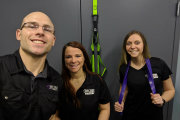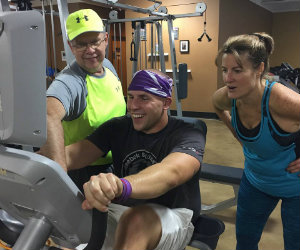Reframe Podcast: Episode 31

Being Your Best Self

James Loy: This is Reframe, The podcast from the College of Education, Health and Society on the campus of Miami university in Oxford, Ohio.
Like most industries today, the fitness industry is changing fast. So in this episode, we talk to an EHS graduate who trying to address some of the problems he sees through the industry, why they might be holding some people back from living healthier lives, and how his path to success, both in wellness and in life, might serve as both a guide and an inspiration to others.
(MUSIC FADE)
Most of us, at some point in our lives, will aspire to become a better version of our current selves. But self-improvement rarely comes easy.
Adam Ortman: I think a lot of people have lost hope with their health, and they don’t know what do or where to go. It’s just a constant thing of failure.
James Loy: That’s Adam Ortman, Anytime Fitness regional manager and part owner of eight locations across Ohio. And unfortunately, he says, this is a scenario that likely resonates with many people. On average, America is in the grip of chronic disease which includes heart disease, diabetes, obesity, and more. And, even in spite of a growing cultural and even entrepreneurial preoccupation with health and wellness, things don’t seem to be getting much better.
Adam Ortman: Two-thirds of America is overweight or obese in some way and yet if you look at a trend line, there is more gyms popping up now more than ever. Yet America hasn’t become healthier in the sense of overweight and obesity. So something is going wrong in the fitness industry. We’re not doing a good job.
James Loy: This is a problem that concerns Ortman deeply. Because for him, self-improvement, especially as it applies to health and wellness, is not just the foundation of a successful career. It’s been a driving force throughout most of his life.
Adam Ortman: I didn’t really have a lot of healthy role models growing up. My brother and I, we were definitely overweight growing up, our breakfasts consisted of the Toaster Strudels and the Pop Tarts and we ate lunches packed with bologna sandwiches and white bread and dinner was Burger King and probably pizza for pretty much through high school. And then I went out for football in high school and I realized that I was the least conditioned kid, and that was a wake-up call for me because in my mind I was very competitive. I always played sports. But I was just completely out of shape and lacked the confidence I needed. So I wanted to learn more about, okay, I am not doing something right. So I started to take an interest in the body heath and I ended up getting into Miami University. And that started my passion into learning about exercise and fitness through the exercises science program there and that’s what really got me going initially into Miami University.
James Loy: While at Miami, Ortman put himself through school in only three years. He was the first in his family to graduate from college. And then in 2012, after earning a degree in exercise and health science, he quickly climbed the ranks with Anytime Fitness, which operates nearly 3,500 franchised locations all around the world. In 2013, he was named as one of only five Member Success Story of the Year for his transformative work with a disabled client. In 2016, he was selected from among nearly 7,000 trainers globally to receive the Personal Trainor of the Year award. And today, he’s on mission. Ortman is fighting against many of the negative health and wellness trends that continue to afflict society. And that includes fixing many of the problems found throughout his own industry. Because alongside the growing number of gyms, we’re also now flooded through a near endless-array of fitness-based apps, videos, live streams, blogs, podcasts, and more. But to what end?
Adam Ortman: It’s never a lack of knowledge. Right. I think, as Americans, if you asked a random stranger on the street, “What is good and bad to eat?” We have a general sense of what is good and bad to eat. We understand that fast food and chips and refined pastas are not the best things for our health. Yet we choose to eat them anyway. And if we eat fruits and vegetables, we are going to become healthier. We all know that. Just like if you asked a stranger, “Hey is exercise going to benefit your health?” They are going to say, “Yes.” So it is not a lack of knowledge. There is just an abundance of knowledge that just gets poured out there, right, through social media, through phones, podcast, books, and videos.
James Loy: So the way to a healthier life is no secret. That’s not the problem. Instead, Ortman says, what most of people really need is more support.
Adam Ortman: They need to figure out how do we execute that knowledge and to put that knowledge into play, into action. And that’s where we try to bridge that gap and we do that through accountability, support, a supportive environment, and through essentially relationships. We want to be the place where when you walk into the gym, you are actually building relationships that aren’t necessarily based on fitness. But based on, you know what, this is my safe place. This is where I can go where maybe I just feel good in life, rather than all the other places I have that just stress me out.
James Loy: His vision is to build long-term connections and deeper relationships with his clients and the community, both inside and outside the gym. And he understands, perhaps more than most, that envisioning a better future, setting a plan, and then making it a reality is difficult. And it may seem daunting. But as someone who has dedicated his life to setting big goals and actually achieving them, he believes that everyone has that same power.
Adam Ortman: The reason I do what I do every day is I want to be that healthy role model. Someone that others can look to when they don’t think there is someone to look to when they are stuck. Whether it’s fitness, something emotional or mental. I didn’t have that growing up. So I wanted to be the best version of myself so I could show others that it is possible. That I could be a resource and be an inspiration for anyone, really, who’s going through a tough time to say look there definitely is a way out. You just need that right support. So I really wanted to be the best version and keep learning and growing myself so others can do they can same.

